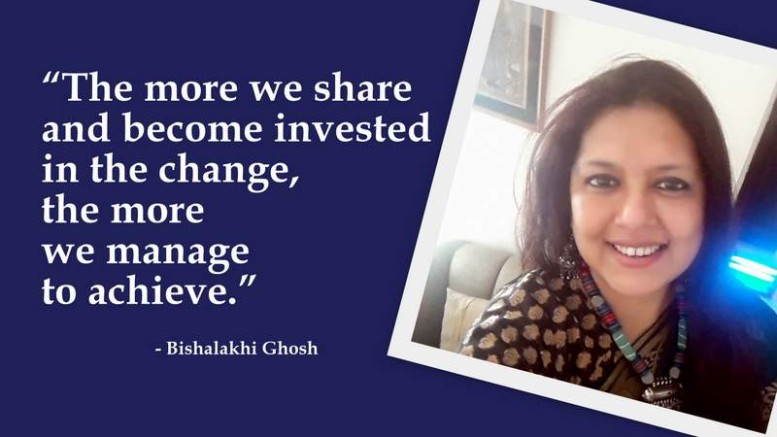Recently while attending a social gathering I was asked to participate in an interesting discussion. The discussion and (a bit of) debate centered on section 135 of the Companies Act which was included in 2013 to make corporate social responsibility (CSR) a compulsory affair. While one group was vocal on the changes it brought in through the CSR spending, the other was unhappy about the voluntary option becoming an obligation.
While nobody questioned the need for doing good, many felt that it should have remained a matter of personal commitment. However, a sizeable number in the discussion remarked that as a country we can only follow the line when we are forced or obliged.
As a CSR and communication professional, it was indeed a discussion I wanted to know more about, as the people there came from multiple professions and from across industries. I have worked in CSR in various countries and have always tried to understand what makes the process a success. What it is that bridges the gap in a way that ushers in development and has the highest impact.
If we look at our country today our economy is under transition. In such a scenario, it is important not only to have regulations which tighten compliance but also ensure positive and proactive participation of stakeholders to facilitate inclusive growth.
Now one may question why is the private sector being asked to participate in inclusive growth? Don’t they pay taxes? Are they not providing employment, training and resource mobilization? It’s both a yes and a no. While India has attained the status of one of the fastest growing economies, it is yet to deal with a lot of inequalities. India is home to one-third of the world’s poor, living on less than $1.25 per day. Several strides might have been taken to achieve socio-economic developments, but India still ranked 130th out of 188 countries in UNDP’s Human Development Index in 2015. Social indicators for health or education put us lower than many other emerging economies.
If we consider all these factors, inclusive growth becomes a necessity to succeed in our quest for development. The amended Companies Act strives to make this dream a reality by integrating social, economic and environmental concerns within the business eco-system.
It has been seen that industrialization of any process makes it more efficient and easier to implement by giving it an outcome/goal-centric focus. With the changing economic environment in India today, the CSR provision is a logical step towards furthering development causes. At this stage it is imperative that stakeholders – corporate, government, NGOs, civil societies – should come together to meet the challenges. Through partnership and resource sharing, economic, environmental as well as societal inequalities can be addressed.
A few years ago, in a white paper published in Harvard Business Review, Michael Porter and Mark R. Kramer dealt with the concept of Shared Value. They talked about reinventing capitalism in the wake of today’s global political and economic conditions, keeping in mind globalization of business and the need to find new avenues for innovation and growth. They analyzed companies which are innovating for Shared Value and outlined their common traits:
- Impetus: re-focusing corporate impetus around meeting societal needs
- Need Identification:identifying distinct, urgent need through research
- Monitor and Measure: monitoring and measuring input and outcome
- Collaboration:working with partners to enhance the reach and expanding boundaries.
- Social Innovation:changing mindset to nurture social engineering
The CSR provision, in the long term, will help Indian corporates to assimilate these traits. Bring about a gap-bridging in community dialogue, higher management buy-in and/or formalized project goals in CSR. Obviously there are bigger Indian corporate/s who have already been working towards societal development but the bigger picture or involvement is little to non-existent. The legislation will help with the growth of an eco-system with training, knowledge, and management thought process for CSR focus. It has been seen that CSR activities bring in positive brand identity both internally and externally, along with a multiplying effect, if the corporate aligns its business with social causes. Business alignment with CSR happens when the selection of the social cause, and ways of intervention and implementation of the same fit with the existing expertise and resources of the company. For example, a pharmaceutical company is best poised to expand into health-related development programs than an automobile company.
However, to do this, the corporate needs to involve its highest level of functionaries in drafting its CSR strategy.
It is for us to decide what would be our CSR growth plan; do we want to follow the examples of the West or create our own comprehensive approach? Our challenges and issues are vastly different and hence it lies on our leaders, both in the corporate and government sectors, to create the approach. Along with that we have individual roles to play – professionals, senior executives need to foster a sustainable mindset, business schools need to train managers and the government needs to have regular dialogues for introduction of policies. A meeting of minds between stakeholders will fuel the momentum needed for our development goals. Sustainability/CSR needs to become more than just a tick in the box. By developing a sustainable mindset at an individual level and harmonizing it at an organizational level, we will be able to realize the bigger picture of both competitive success and social impact.
So our discussions continue, which in my opinion is a positive thing. Because the more we talk with each other, the more we learn. The more we share and become invested in the change, the more we manage to achieve.








Be the first to comment on "CSR as a Means to Equitable Growth"